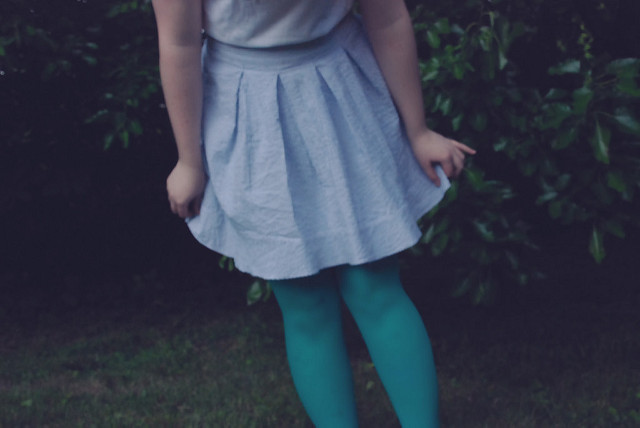I was frantically shopping for a dress for a big interview this evening.
I was caught up in my own little world of trying to find the perfect garment to cover all my tattoos without stripping me of my personality entirely. While trying on a huge pile of dresses and suits, I heard a mother and daughter in the dressing room next to me, chatting as mothers and daughters do.
The daughter was trying on clothing. She would put something on, and she and mom would check it out together. After a couple tries, mom told her to go show her dad one of the outfits they both liked.
When the daughter reached the little space outside the dressing rooms, the dad said loudly, “Absolutely not. You’re not getting that.”
The daughter asked, “Why?”
She liked it. Mom liked it. What was the problem?
“Mom said it was cute!” she protested.
“It would be cute if these weren’t out to there!” The dad announced to what seemed like the whole department store. He went on—pointing out all the things he disliked about what she was wearing and the way it made her young body look.
When she returned to the dressing room, the mom didn’t have much to say. She just offered another outfit to try.
Each time she went to show dad something, his reaction was about the same, until he started yelling to mom, “She’s not getting that! Stop putting her in clothes that make her look like that.”
When the girl returned to the dressing room after a few of those reactions, she was crying. She told her mother she didn’t want to shop anymore. Her mom told her to get dressed and left her in the room alone to get herself together.
My heart ached for the little girl who wept in the room beside me. I wanted to hug her tight and tell her how absolutely perfect she is. I could only imagine how embarrassed she was. I was mortified for her—so much that I briefly considered going to tell her dad what an ass he was.
I decided to stay out of their exchange, as clearly, it was not my business. Still, I wondered if that dad had any idea what his disdain for his daughter’s changing physical form did to her self-worth. I wondered if he realized how those moments of humiliation might affect her for years to come.
Could he see the way he was objectifying his daughter?
Listening to this man criticize his daughter’s body was such a vivid illustration of the rape culture we live in. He’s teaching her, day by day, that her body is wrong. It’s terrible, and dirty, and should be covered and concealed—and shame on her for daring to have wicked feminine things like breasts and hips.
He is teaching her to dress for the comfort and preference of the males around her, rather than allowing her the opportunity for authentic self-expression. Instead of encouraging his daughter to wear what feels comfortable and right for her, he is teaching her to allow others to determine what is good and right for her.
This is how girls learn to hate their bodies. Girls who hate their bodies grow up to become women who still hate their bodies many years later.
This is why teenage girls walk through life with stooped shoulders and crossed arms. We learn “big girl” body shame the moment our young bodies begin to show signs of womanly development.
This is why girls choose baggy, non-revealing, sometimes even boyish clothing. We’re not lazy or frumpy. We’re hiding out to avoid unwanted attention and criticism.
This is how slut-shaming begins, as girls learn what is “good” and “bad,” and they use those ideas to judge and criticize each other. This type of mean girl sh*t is not born into us—it’s learned behavior. We learn it from the grownups in our lives who judge each other.
This is why weight loss, plastic surgery, cosmetics, and other appearance-based industries are making billions of dollars. They depend on our insecurities and desire to fit into the narrow standards of beauty we experience in our culture.
After the sweet baby in the room next door dried her tears and left, I examined my own imperfect female body in the full-length mirrors that surrounded me. It’s taken almost 40 years for me to love and accept myself with all my flaws, extra pounds, stretch marks, loose skin, and freckles.
I spent my whole life hating my curly hair, my curvy body, my short legs and torso, my small breasts—and especially my belly. I can trace these things back to my childhood and the cruel things people said to me when I was still impressionable. Some of these things came from mean kids at school. Some of them came from my own parents trying to mold me into the little person they wished I was.
Self-acceptance for me was an active process of letting go of the expectations of others. It hinged upon my ability to give myself permission to just be myself in a world that demanded I be someone else. By some miracle, I’ve been able to learn how to love myself and not make myself miserable trying to conform to standards that are not mine. I’ve discovered that my worth as a human being on this earth is inherent—and has nothing to do with societal conventions or the pressures that come from them.
If I had spoken up for the little girl in the dressing room tonight, I would have told her father that he is the most important masculine force in his daughter’s life. Every word he speaks to his little girl is indelibly written upon the slate of who she is.
If he continues to tear her down, criticize her, and objectify her, he will effectively rob her of her self-worth. She will walk through life feeling ashamed of her body, and she’ll be in constant need of validation from outside herself to make her feel good. He is showing her that she is inferior, and she might spend the rest of her life believing him and finding ways to reinforce the beliefs he is instilling in her with his words.
If he wants her to be confident, empowered, and have healthy self-esteem, he should tell her every single day how beautiful she is. But not just beautiful. Smart. Capable. Funny. Brave. Brilliant. Creative. Compassionate.
He should celebrate all her strengths and point out all the best things about her, so she knows that she is more than her appearance. Certainly, her appearance is the least interesting thing about her, and she has much greater contributions to make in this lifetime than just being a pretty face.
We can end rape culture in two easy steps beginning with our children.
Step one: Teach girls to dress in a way that feels comfortable and right for them.
Step two: Teach boys to respect girls as human beings.
With these simple lessons, we can begin to shift misogyny and make space for girls and women everywhere to feel good in their skin while just being who they are.
~
Author: Renee Dubeau
Image: Flickr/Danielle Moler
Editor: Yoli Ramazzina









Read 0 comments and reply